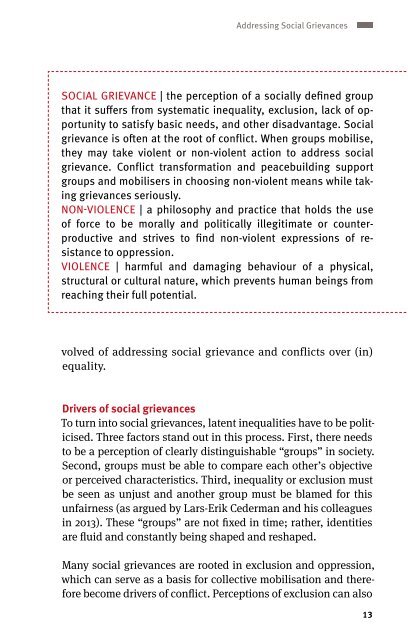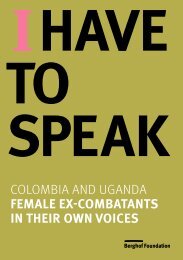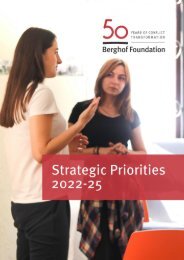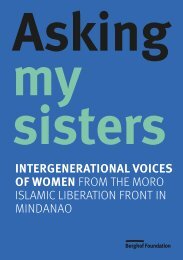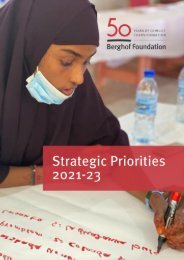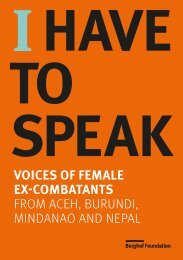Berghof Glossary on Conflict Transformation
The Berghof Glossary on Conflict Transformation presents 20 of the main principles and approaches used by the Berghof Foundation in its work. It is a concise and accessible exploration of what it takes to create “space for conflict transformation”. 2019 edition.
The Berghof Glossary on Conflict Transformation presents 20 of the main principles and approaches used by the Berghof Foundation in its work. It is a concise and accessible exploration of what it takes to create “space for conflict transformation”. 2019 edition.
Create successful ePaper yourself
Turn your PDF publications into a flip-book with our unique Google optimized e-Paper software.
Addressing Social Grievances<br />
SOCIAL GRIEVANCE | the percepti<strong>on</strong> of a socially defined group<br />
that it suffers from systematic inequality, exclusi<strong>on</strong>, lack of opportunity<br />
to satisfy basic needs, and other disadvantage. Social<br />
grievance is often at the root of c<strong>on</strong>flict. When groups mobilise,<br />
they may take violent or n<strong>on</strong>-violent acti<strong>on</strong> to address social<br />
grievance. C<strong>on</strong>flict transformati<strong>on</strong> and peacebuilding support<br />
groups and mobilisers in choosing n<strong>on</strong>-violent means while taking<br />
grievances seriously.<br />
NON-VIOLENCE | a philosophy and practice that holds the use<br />
of force to be morally and politically illegitimate or counterproductive<br />
and strives to find n<strong>on</strong>-violent expressi<strong>on</strong>s of resistance<br />
to oppressi<strong>on</strong>.<br />
VIOLENCE | harmful and damaging behaviour of a physical,<br />
structural or cultural nature, which prevents human beings from<br />
reaching their full potential.<br />
volved of addressing social grievance and c<strong>on</strong>flicts over (in)<br />
equality.<br />
Drivers of social grievances<br />
To turn into social grievances, latent inequalities have to be politicised.<br />
Three factors stand out in this process. First, there needs<br />
to be a percepti<strong>on</strong> of clearly distinguishable “groups” in society.<br />
Sec<strong>on</strong>d, groups must be able to compare each other’s objective<br />
or perceived characteristics. Third, inequality or exclusi<strong>on</strong> must<br />
be seen as unjust and another group must be blamed for this<br />
unfairness (as argued by Lars-Erik Cederman and his colleagues<br />
in 2013). These “groups” are not fixed in time; rather, identities<br />
are fluid and c<strong>on</strong>stantly being shaped and reshaped.<br />
Many social grievances are rooted in exclusi<strong>on</strong> and oppressi<strong>on</strong>,<br />
which can serve as a basis for collective mobilisati<strong>on</strong> and therefore<br />
become drivers of c<strong>on</strong>flict. Percepti<strong>on</strong>s of exclusi<strong>on</strong> can also<br />
13


